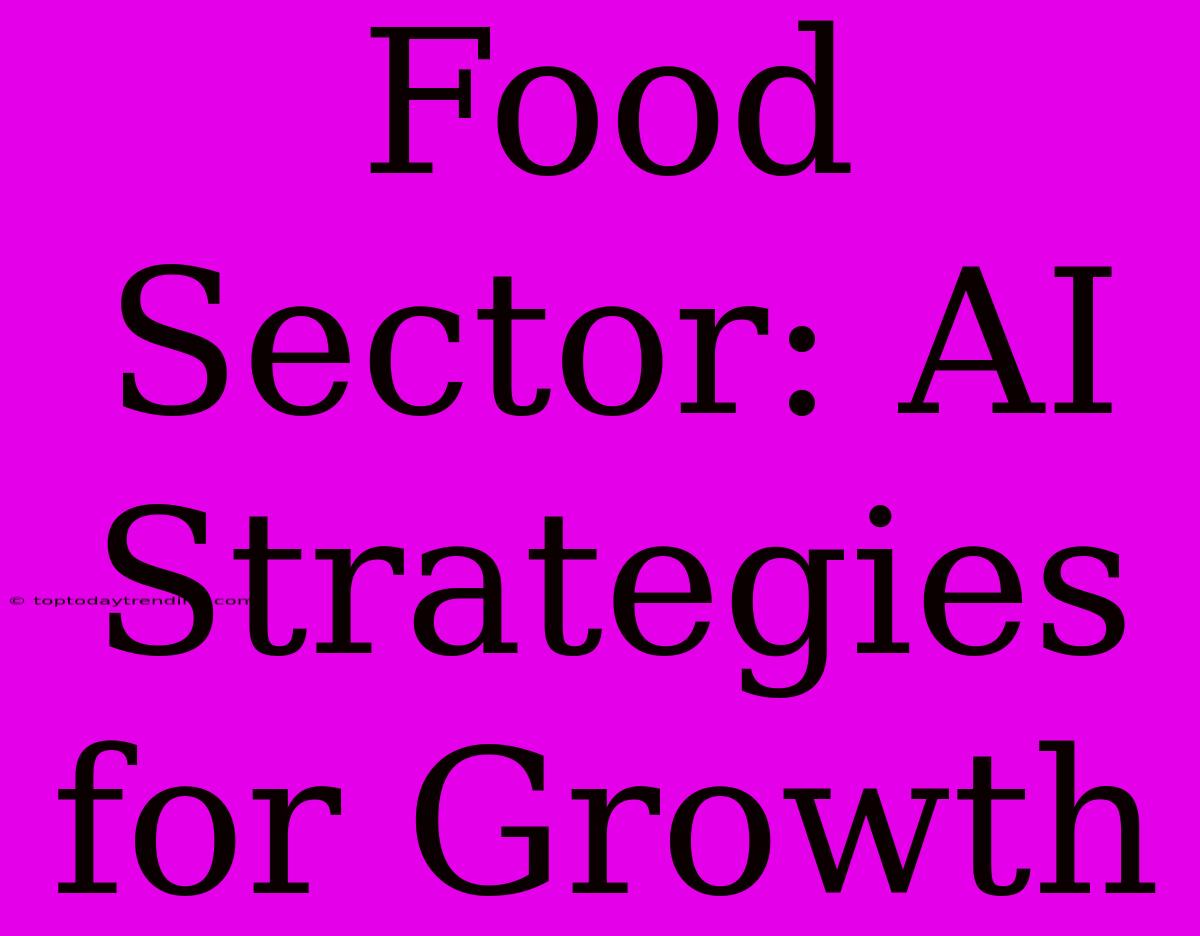Food Sector: AI Strategies for Growth
The food sector is undergoing a massive transformation, driven by factors like changing consumer preferences, rising demand for sustainable practices, and the growing adoption of technology. Artificial intelligence (AI) is emerging as a powerful tool to navigate these challenges and drive growth in the industry.
AI: A Game Changer for the Food Sector
AI offers a range of solutions that can revolutionize various aspects of the food industry, from farm to table. Here are some key areas where AI is making a significant impact:
1. Precision Agriculture:
- Optimizing Crop Yields: AI-powered systems analyze data from sensors, drones, and satellites to optimize crop yields. This includes predicting weather patterns, identifying pests and diseases, and adjusting irrigation and fertilization schedules in real-time.
- Sustainable Farming: AI helps farmers optimize resource usage, reduce waste, and implement sustainable practices, contributing to a greener food system.
2. Supply Chain Management:
- Demand Forecasting: AI algorithms can analyze historical data and market trends to predict demand accurately, enabling companies to optimize production and inventory levels.
- Efficient Logistics: AI-powered systems can optimize transportation routes, reduce delivery times, and minimize spoilage, ensuring efficient and cost-effective supply chain operations.
- Real-Time Tracking: AI allows for real-time tracking of food products throughout the supply chain, improving traceability, safety, and accountability.
3. Food Processing and Manufacturing:
- Process Optimization: AI can analyze production data to identify bottlenecks, optimize equipment usage, and minimize waste, leading to increased efficiency and reduced production costs.
- Quality Control: AI-powered vision systems can inspect food products for defects and contamination, ensuring quality and safety throughout the manufacturing process.
- Personalized Products: AI can tailor food products based on individual dietary needs and preferences, leading to a wider range of customized and healthy options.
4. Consumer Engagement and Marketing:
- Personalized Recommendations: AI can analyze consumer data and preferences to offer personalized food recommendations and suggest new products and recipes.
- Targeted Marketing: AI can help companies target specific customer segments with relevant food products and promotions, enhancing brand awareness and engagement.
- Interactive Experiences: AI-powered chatbots and virtual assistants can provide personalized customer service, answer questions, and offer recommendations, creating an engaging and personalized customer experience.
5. Food Safety and Security:
- Disease Prevention: AI can help predict and prevent outbreaks of foodborne illnesses by analyzing data on food production, handling, and distribution.
- Fraud Detection: AI algorithms can identify fraudulent activities and counterfeit products in the food supply chain, ensuring food safety and security.
- Traceability: AI-powered systems can track the origin and journey of food products, allowing for swift identification and recall in case of food safety incidents.
Strategies for Implementing AI in the Food Sector
Implementing AI in the food sector requires a strategic approach to reap its full benefits. Here are some key considerations:
- Data Acquisition and Management: Companies need to collect, clean, and manage vast amounts of data to train AI models effectively.
- Choosing the Right AI Solutions: Selecting AI solutions that align with specific business needs and challenges is crucial for successful implementation.
- Building Expertise and Infrastructure: Developing in-house expertise and investing in IT infrastructure are necessary to support AI adoption.
- Addressing Ethical Concerns: Implementing AI in a responsible and ethical manner, considering data privacy, transparency, and potential biases, is essential.
- Collaboration and Partnerships: Collaborating with experts in AI and food technology can accelerate the adoption of AI solutions and foster innovation in the sector.
Conclusion
AI is transforming the food sector, offering numerous opportunities for growth and innovation. By leveraging AI technologies, businesses can optimize operations, improve efficiency, enhance customer experiences, and create a more sustainable and resilient food system. Embracing AI is not just an option for the future, but a necessity for staying competitive in the rapidly evolving food industry.

